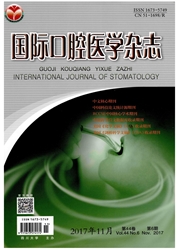

 中文摘要:
中文摘要:
韦荣球菌为口腔微生态的重要成员之一,在人类口腔中呈高丰度分布。韦荣球菌不能代谢糖产酸,但能代谢乳酸,这一点曾被认为对龋病的发生发展有抑制作用,但体外及动物试验对于韦荣球菌在龋病发生中的作用及其机制并未得出明确结论。近来随着口腔微生物组学研究的发展,人们发现,韦荣球菌在龋活跃者口腔中的分布较无龋者高,韦荣球菌与多种致龋菌分布呈高度相关性,韦荣球菌对变异链球菌等致龋菌有促进作用。龋病是多种微生物共同作用的结果,而韦荣球菌作为龋病相关因素不容忽视。本文就韦荣球菌在口腔中的分布、韦荣球菌与龋病的关系、韦荣球菌与链球菌的相互作用等研究进展作一综述,以剖析韦荣球菌在龋病发生发展中的作用及其机制。
 英文摘要:
英文摘要:
The genus Feillonella is a member of the normal oral flora and is highly abundant in the human oral cavity. Feillonella utilizes lactate, which ameliorates the caries process. However, results of in vitro studies and rat model systems are ambiguous. With the development of human oral microbiome research, several studies reported that the frequency of Feillonella in caries-activated individuals is higher than that in caries-free ones, and the distribution of Feillonella is highly related to some cariogenic Streptococcus species. Veillonella facilitates the action of some cariogenic Streptococcus species, such as Streptococcus mutans in caries development. These findings create new focus on the genus Feillonella as a factor relating to caries. This paper provides a review on the distribution of Feillonella in human oral cavity, the relationship between Veillonella and caries, and the relationship between Veillonella and Streptococcus species related to caries.
 同期刊论文项目
同期刊论文项目
 同项目期刊论文
同项目期刊论文
 期刊信息
期刊信息
